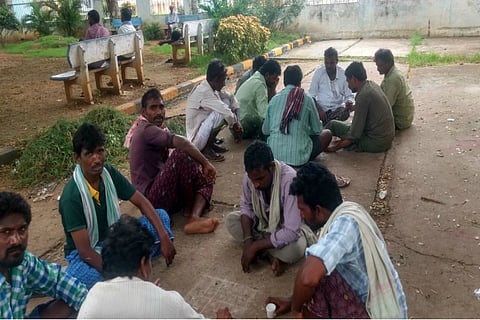

Thirty-five-year-old B Nagaraju sits next to his colleagues who are playing ashtachamma (local dice game) under the tree, at Asia’s largest market yard - the NTR market yard in Guntur.
He tells TNM, "It's been one month and we don't have work to do. We have to find some other work outside, otherwise just keep passing time like this.”
Guntur Mirchi yard has not been conducting business for some time now and this is affecting the livelihood of farmers, labourers and clerks (Gumastas) working there. The agitating stakeholders are blaming the union government’s new bidding policy e-NAM (Electronic National Agricultural Marketing).
The e-NAM policy has been introduced in 23 markets across the state and 585 market yards all over the country as a national policy. The initiative aims to ensure transparency, instant payments and reduction of commission cost to farmers. This will also enable farmers to offer their produce to buyers all over India.
Opposing the government’s move, traders and commission agents stalled transactions in the market yard which sees trading of 1.5 lakh quintals of mirchi /chilli per day.
In Guntur district alone, nearly one lakh farmers, out of which 80% are tenant farmers, are dependent on Mirchi (chilli) crop.
Why E-NAM is a problem?
Botla Ramakrishna, tenant farmer on 10 acres of land and an executive member of Tenant Farmers Sankshema Sangam says, "Per acre, it costs an investment of Rs 1 lakh and if it’s a tenant farmer, it will cost Rs 30,000 more, who will give that? The government anyway doesn't give, while banks will never consider tenant farmers as farmers.”
Commission agents who work with farmers and traders, ensure that farmers get loans at 2% interest (most of the times more) till the crop reaches the yard and is sold.
He said that the government doesn’t provide loans and tries to harm the alternative sources. “It's like mother neither gives nor let’s us ask (amma pettadu adukkoniyadu)."
For over the past one month since the E-NAM policy came into force on September 1, the traders have stopped trading. This has meant that neither is the farmers’ produce getting sold nor are they being given loans, thereby putting a question mark over their future for the upcoming Rabi season.
At present, mirchi is being given at a standard rate of Rs 6,800 per quintal.
They are not hearing to give support price, last year dry chilli was sold at Rs 12000.
While farmers are desperate to sell their crop, approximately 5,000 coolies, most of them migrant labours from Sreekakulam, Vizianagaram who load and unload the mirchi, are also "facing trouble".
Sreenivasa Rao, another farmer who owns six acres of land in Tenali says, "Since they have stopped trading, we have to keep most of our produce in cold storage, rent is an extra burden."
CH Vishnu and Ramesh are daily wage migrant coolies in the yard, who come from Ponduru in Sreekakulam district. They say, " Finding work outside has become difficult. We don’t get enough wages but we have to do something to sustain ourselves, otherwise we have to stay hungry.” Both usually get around Rs 400-500 per day at the yard.
Ramesh says "Since the transactions are (bandh) called off, now we are incurring too much expense on meals outside. Earlier at least, we used to have food at canteens inside for a lesser price."
While the government maintains that the new policy will help farmers to get the best price for their produce since it allows multiple traders to involve in the bidding process, activists are saying it ultimately affects the farmers and "disrupts" local markets.
N Kalidasu of Rythu Cooli Sangam alleges, "This is similar to the way they dismantled tobacco and cotton. Slowly, big companies will enter into the bidding and they will decide the price leaving no choice for farmers but to accept."
B Sukra, member of Gumasta Associaltion says, “It's been one month since the transactions were stopped. Some of the traders (owners) paid salary for this month, but if this continues they will definitely not pay. Who will assure us livelihood?"
He also added, "With my 15 years of experience I'm telling this, it is not possible in Guntur yard. Where is the digital equipment, this method of open bidding will cost at least Rs 50 more for each quintal to the farmer. Moreover, without the right amount of humidity, the crops would be completely lost.”
CPM, CITU, Rythu Cooli Sangam and other organisations are urging the government to step in and resume functioning of the Market Yard immediately. CITU District leader Nalinikanth told TNM, "Other than farmers, at least 20,000 workers are being affected directly or indirectly by this."
Meanwhile, the State Marketing Department Commissioner, Samuel Anand, told media on Friday that it’s not possible to go back on the E-NAM decision, but they will consider certain concerns of traders who agreed to start the transactions soon.